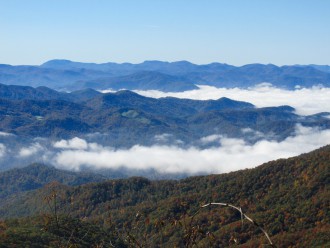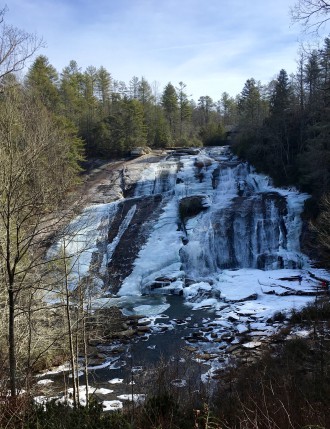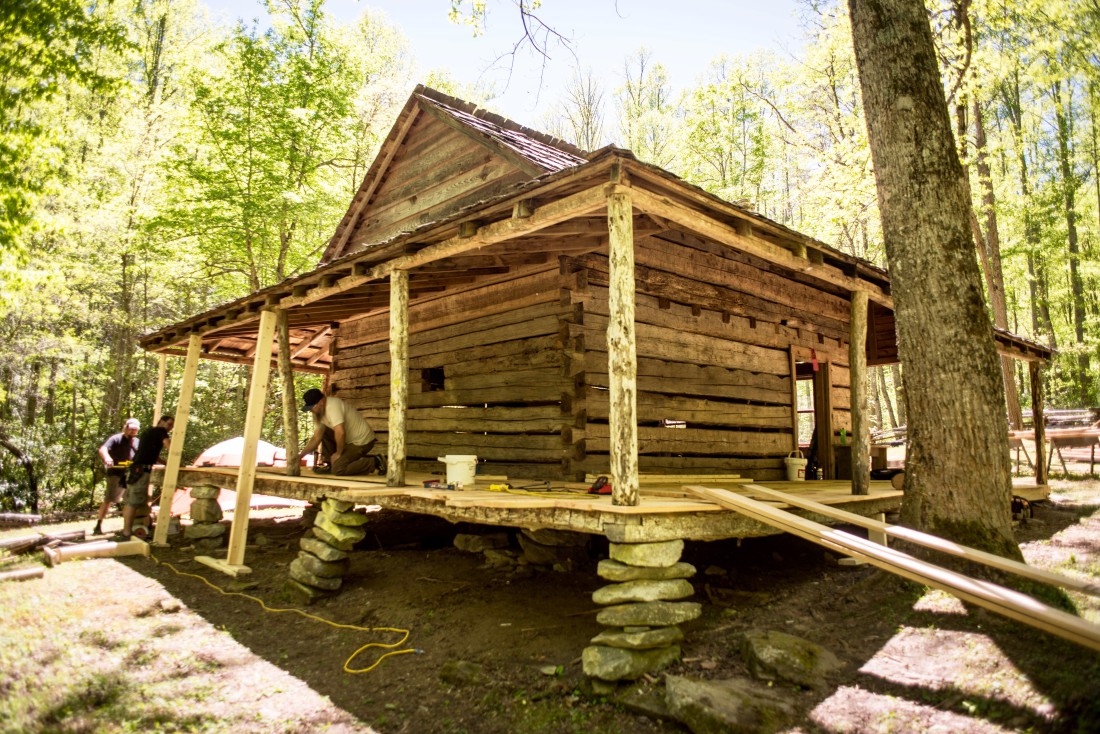We all need friends, and public lands in Western North Carolina increasingly receive care in the form of “Friends” nonprofit groups. In an era of shrinking federal budgets for parks and forests, these organizations are stepping up to preserve and maintain public spaces.
“Friends groups used to be the margin of excellence; now they’re the margin of survival,” Sally Jewell, then-U.S. secretary of the interior, said in Tennessee in 2014.
As just one example of the decreased cash flow for public lands, the 2018 National Park Service budget request for operations is $2.2 billion, a drop of $143.8 million from 2017. Picking up the slack are Friends groups for public lands, nonprofit organizations that help a park or forest with funding and volunteers. Usually, such groups have a formal relationship with the official land manager, and informally they give people a chance to give back to the landscapes they enjoy.
Smokies get local love
Friends of the Smokies was created in 1993 to provide funds for that “margin of excellence,” says Anna Zanetti, North Carolina director of the group. “With increasing maintenance backlog and a rise in visitation that outpaces the federal budget, our funds now contribute to the more basic needs of Great Smoky Mountains National Park,” she says.
Local individuals and businesses often add to the efforts of nonprofits to improve the condition of public lands. Last spring, Asheville-based licensed building contractor Sean Perry and his crew spent several days restoring the Cook Cabin in the Little Cataloochee section of the Smokies. His firm donated time, labor and expertise on the project while Friends of the Smokies provided almost $9,300 for materials. Perry and his team also plan to refurbish a large ramp leading to the Palmer House Barn, also in Cataloochee.
This year Friends of the Smokies has pledged over $1.2 million for projects and programs to the park in North Carolina and Tennessee. The North Carolina office recently moved to Asheville, a step the organization hopes will create opportunities for new relationships with Smokies enthusiasts and businesses in the community.
Voice of the Parkway
The 469-mile Blue Ridge Parkway, which received more than 15 million visitors in 2016, gets a boost from the Asheville-based Blue Ridge Parkway Foundation. In 1997, its first year of operation, the foundation donated a few thousand dollars to the parkway; last year, it gave $1.2 million. Altogether the foundation has raised over $12 million in projects and programs.

Specialty license plates are an important part of this fundraising; for each plate sold, $20 goes to the foundation. “Over 27,000 cars have our specialty plate,” says Carolyn Ward, executive director of the foundation.
“We’re the voice of the park. We serve the park — and not just with money,” says Ward. The group surveys its donors regularly and responds to their changing areas of interest. Three years ago, its donors said their primary issue was protecting the environment; this year, it’s advocacy.
“We need to educate and advocate for federal dollars for our parks,” Ward says. To that end, the foundation staff meets with legislators to explain the park’s needs.
The Blue Ridge Parkway Foundation undertakes projects to better visitors’ experiences. For example, it has refreshed the interpretive information at the Buck Springs Lodge site. George W. Vanderbilt’s hunting retreat there is long gone, but the signs help visitors imagine life at the beginning of the 20th century. The foundation also provided funds to build a restroom facility and expand the parking lot at the Graveyard Fields trailhead.
Phil Francis, retired superintendent of the Blue Ridge Parkway and former acting superintendent in the Smokies, says nonprofits enhance the visitor experience by working with the National Park Service to make improvements.
“Friends groups fund a list of projects approved by the park superintendent. Friends groups usually don’t fund routine expenses,” Francis says. “But with the budget cuts the parks have taken, things are different now. I don’t know what we would have done without Friends groups in either the Smokies or the Blue Ridge Parkway. They provide money and thousands of volunteer hours.”
Creators of trail magic
Running through the Blue Ridge Parkway, the Mountains-to-Sea Trail extends over 1,100 miles across North Carolina, from Clingmans Dome in the Smokies to the Outer Banks. Friends of the MST, or FMST, is a statewide organization based in Raleigh with several board members living in WNC, including the group’s current president, Steve Metcalf.
“The MST is a beautiful expression of North Carolina and her people,” Metcalf says. “The magic of the MST is the service provided by the many volunteers who build and maintain the trail. The trail in the mountains wouldn’t exist without FMST and Carolina Mountain Club.” CMC is a hiking and trail-maintaining club based in Asheville.
Kate Dixon, executive director of Friends of the MST, points to tangible results of the group’s efforts. “Thanks to the work of committed volunteers and donors, the portion of the trail which connects the Smokies to Waterrock Knob is close to completion,” she says. “Volunteers were instrumental in the Waterrock Knob project, an extraordinary trail-building feat. When you walk it, it looks like it’s always been here.”
Forests need friends, too
The Pisgah Ranger District, which extends 162,000 acres from Bent Creek west to the Middle Prong Wilderness, now has a champion in the Pisgah Conservancy. A newcomer to protecting national forests in the area, the Pisgah Conservancy was created in 2015 to provide funding to preserve the natural resources and beauty of Pisgah Ranger District and to enhance the recreational experience of all visitors.

Founder John Cottingham has been camping in Pisgah with friends for 40 years. He noticed that trails were degrading, and when he couldn’t find a Friends group for the forest, he was introduced to Carleton Murrey, the executive director of the Cradle of Forestry Interpretive Association. Cottingham and Murrey pulled together representatives of user groups — hikers, equestrians, mountain bikers, hunters — for the conservancy’s advisory board.
The group’s signature event is Pisgah Pride Day, a work day that helps volunteers feel invested in the forest. Last year, more than 350 volunteers pitched in for trail maintenance, trail building and trash pickup. This year’s Pisgah Pride Day is scheduled for May 5, and the group also hopes to hold monthly work days.
Lavoe Davis, director of development for the Pisgah Conservancy, says the group works closely with the Forest Service. “We entered an agreement with the U.S. Forest Service, which is still figuring out how to accommodate visitors. They don’t have the funds or personnel to maintain trails or get rid of invasive species,” she says. “All our projects are approved by the USFS.”
David Casey, district ranger for the Pisgah District, explains there’s a formal agreement, a general memorandum of understanding, between the USFS and the Pisgah Conservancy as well as other agreements that are project-specific. “Right now, we’re not able to serve recreational visitors like we’d like to serve them,” he says. “We’d like to have an increased presence in the forest. But we’re fortunate to have active volunteers.”
DuPont State Recreational Forest, located between Brevard and Hendersonville, was once a private chemical industrial site but has transitioned into an outdoor mecca. The state forest was established in 1995 and has been growing ever since as a hybrid public space that combines recreation with forestry.
Friends of the Falls, formed in 2000, is credited with rallying public support to save DuPont’s three iconic waterfalls: High, Triple and Bridal Veil Falls. After the land was preserved for the public, Friends of the Falls morphed into Friends of DuPont Forest, a group dedicated to trail work, trail signs and education.
Until now, Friends of DuPont Forest was managed completely by volunteers. At the beginning of January 2018, Sara Landry became its first executive director and first permanent staff member. “We have 450 members and work in partnership with the state. Our funds go directly to trails and education. We maintain 84 miles of trail and work with the N.C. Forest Service on major projects,” she says. “Our organization is going to expand with so many new people moving into Henderson and Transylvania counties.”
The group is helping fund new bathrooms at the Hooker Falls trailhead and parking area and building relationships with chemical company DuPont, which is still cleaning up its core site and plans to turn the land over for public use.
Getting on board for greenways
Parks in town can also benefit from local groups’ support. “Believe it or not, there are plenty of Asheville residents who do not leave Asheville,” Marcia Bromberg, past president of Connect Buncombe, said at a recent talk to the WENOCA Chapter of the Sierra Club. “That’s why we need greenways.”
In 2012, Buncombe County approved the greenway master plan but without any funds to implement it. Friends of Connect Buncombe was formed to support the implementation of the master plan. Bromberg sees a hundred miles of greenways in the future, including paved paths as well as temporary or permanent unpaved trails for walkers and cyclists.
The group has grown steadily since its inception in 2014 — from 109 members, friends and individual contributors that year to 211 as of the end of 2017, according to Bromberg.
While Connect Buncombe has ambitious plans with miles of new greenways in its future, Friends of Hominy Creek Greenway is very focused. Formed in 2012, it’s a small but active group that protects land bordering part of the northern side of Hominy Creek and Buttermilk Creek between Sand Hill Road and Hominy Creek Road in Asheville. A natural surface greenway runs about three-quarters of a mile through the property.
Jack Igelman, past president of the Friends group, points to individual contributions to the greenway project. “Doug ‘Brotherhug’ Barlow deserves enormous credit for the greenway. Without him it would likely have been developed or, at least, closed to the public,” Igelman says. “He and Marc Hunt did a world-class job of raising funds and building support that led to its purchase by the city.”
The Friends of Hominy Creek Greenway holds the community vision for the park and has a partnership agreement with the city of Asheville designating the organization as stewards.
When asked about the number of members in the Friends group, Igelman sees the success of the group differently. “I will say that the number of members is not a metric that’s particularly important to our board and a poor measure of our reach and impact,” he says. “As a small grassroots group, our goal was to build a coalition of dedicated volunteers and community members to help steward the 14-acre park that we manage in cooperation with the city.”
Igelman says from his perspective, spending an afternoon clearing invasive plants is as valuable as a $25 membership. “We’ve had hundreds of volunteers improve trails and facilities and build enthusiasm for the greenway,” he says. “I’m proud of helping to build an all-volunteer organization that maintain one of my favorite chunks of public land in all of Western North Carolina.”
Danny Bernstein is an active volunteer with Friends of the Smokies.



Before you comment
The comments section is here to provide a platform for civil dialogue on the issues we face together as a local community. Xpress is committed to offering this platform for all voices, but when the tone of the discussion gets nasty or strays off topic, we believe many people choose not to participate. Xpress editors are determined to moderate comments to ensure a constructive interchange is maintained. All comments judged not to be in keeping with the spirit of civil discourse will be removed and repeat violators will be banned. See here for our terms of service. Thank you for being part of this effort to promote respectful discussion.